Boston-IA 2008 Events
In 2008, Boston-IA presented, co-sponsored, or participated in the following events:
- November 13, 2008: Participation in World Usability Day 2008
- October 22, 2008: Mike Paciello on the New Section 508
- July 22, 2008: Boston Interactions Summer Pot Luck Picnic 2008
- June 2008: Boston-IA Celebrates Its Fifth Anniversary and Changes Its Tagline
- June 5, 2008: Fidelity Investments on Accessible Dynamic Content
- April 30, 2008: HiSoftware on Setting Up a Web Accessibility Program
- March 19, 2008: Surfing the Web by Voice at Nuance Communications
- Febuary 6, 2008: WGBH on Making Multimedia Accessible
- January 8, 2008: First Annual Boston Usability Groups Networking Party
For information about other Boston-IA meetings:
- Read about 2011 Events.
- Read about 2010 Events.
- Read about 2009 Events.
- Read about 2007 Events.
- Learn about all Boston-IA meetings to date.
Participation in World Usability Day 2008 (November 13, 2008)
World Usability Day is an annual program that consists of concurrent events around the world to raise public awareness about the role of usability and accessibility in making designs easier to use and understand: "Making life easy!". The focus for this year was on Transportation.
On Thursday, November 13, 2008, from 9:00 a.m. to 5:00 p.m., Boston-IA members joined the Boston chapter of the Usability Professionals' Association (UPA), Boston CHI, the Accessibility and Usability Group at MIT, and other local volunteers at Boston's Museum of Science to bring this fun-filled, day-long event to Boston.
This was the fourth year in a row that Boston-IA members and friends have helped to conduct or supervise usability activities for day-time visitors at the Museum of Science— particularly school-aged children, their teachers, and their chaperones.
Boston-IA has traditionally contributed to the "The Evaluation Station", an activity in which volunteers conduct free web site usability and accessibility evaluations for local organizations. This year, we participated in a wide variety of activities.
Learn more about World Usability Day:
- Learn about World Usability Day 2008 in Boston.
- Visit the Global World Usability Day web site.
- Learn about Boston-IA participation in World Usability Day in previous years.
Mike Paciello on The New Section 508 (October 22, 2008)
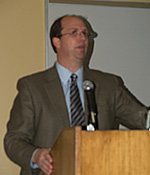
On Wednesday, October 22, 2008, Boston-IA presented Boston-IA Emeritus Board Member, Mike Paciello, president of The Paciello Group, speaking about his work as co-chair of TEITAC (Telecommunications and Electronic and Information Technology Advisory Committee)— the committee charged by the Federal government with updating the Section 508 and Section 255 accessibility technical standards.
Mike's talk was entitled, "The New Section 508: Modeling Usability, Interoperability, and Harmonization".
Any company or organization that wants to sell information technology products to the U.S. federal government, or which has a customer with such a requirement, is governed by Section 508. Communications products are governed by Section 255.
Mike's presentation discussed the work of the TEITAC committee and the new set of recommendations for accessible information and communication technology that the committee submitted to the United States Federal Access Board for approval on April 3, 2008.
Download Mike's October 22 presentation in PDF format, or access the text-only versions of Mike's presentation and handout:
Additional resources Mike mentioned during his presentation include:
- TEITAC Final Draft Recommendations (HTML Format).
- TEITAC Final Draft Recommendations (Microsoft Word Format, 1.25 MB).
- TEITAC Wiki: Archive of the TEITAC working documents at WebAIM.
- TEITAC Provision Custom Display Tool: A filter tool developed by the Trace Center at the University of Wisconsin-Madison.
Additional links to learn more:
- Visit the U.S. Access Board Section 508 Update index.
- Read about the current version of Section 508.
Photograph of Mike Paciello, © 2008 P.J. Gardner. All rights reserved.
Boston Interactions Summer Pot Luck Picnic (July 22, 2008)
On Tuesday evening, July 22, Boston-IA joined other Boston area user experience groups for an informal summer pot-luck picnic at Mayor Thomas W. Danehy Park in Cambridge, Massachusetts.
The networking picnic welcomed members and guests of Boston Interactions, a consortium of Boston area user experience organizations, currently including:
- Boston-IA
- Boston CHI (Boston Chapter of ACM SIGCHI)
- Boston IxDA (Local Face-to-Face Group of the Interaction Design Association)
- NEC HFES (New England Chapter of the Human Factors and Ergonomics Society)
- STC Boston (Boston Chapter of the Society for Technical Communication)
- UPA Boston and UPA NH (Boston and New Hampshire Chapters of the Usability Professionals Association)
- UXNet Boston (Boston Locale of the User Experience Network)
- Web Innovators Group
To find out about future events of the Boston Interactions groups, please visit:
- Boston Interactions Events Calendar (new window, limited accessibility).
Boston-IA Celebrates Its Fifth Anniversary and Changes Its Tagline
Boston-IA celebrated its fifth anniversary in June 2008. It was time for a change, so the Boston-IA board of directors voted to update our tagline to more accurately reflect what we are all about. The old tagline, "Bringing Information Architecture and Internet Accessibility Together", has been retired.
We think our new tagline, "Making Internet Accessibility Maintream", better represents our mission:
- To advocate for Web accessibility.
- To keep people informed about the latest accessibility standards and guidelines.
- To help people learn the techniques that make the World Wide Web more usable and accessible for all.
- To connect with the wide range of professionals who work with the delivery of electronic information using Internet technologies.
Fidelity Investments on Universal Usability of Dynamic Content (June 5, 2008)
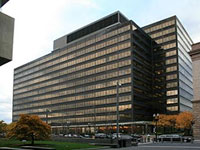
On Thursday, June 5, 2008, Boston-IA presented Marguerite Bergel and Ann Chadwick-Dias of the Web Technology Group at Fidelity Investments on "Universal Usability of Dynamic Content: Making Flash, AJAX, and DHTML Usable for Everyone".
As the Web transforms into a dynamic, richly interactive experience, universal access issues are being driven to the forefront. While new technologies like Flash, Flex, DHTML, and AJAX increase the interactivity of the online experience, many believe that they also reduce universal usability.
The talk examined three case studies from the Fidelity business that demonstrated different approaches to the universal usability of dynamic content.
The meeting was hosted by Fidelity Investments in downtown Boston and included a tour of Fidelity's state-of-the-art usability lab.
Photograph of the Stone and Webster Building, © 2008 Pete McNally. All rights reserved.
HiSoftware on Setting Up a Web Accessibility Program (April 30, 2008)
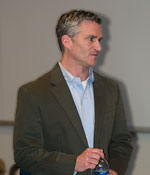
On Wednesday, April 30, 2008, Boston-IA presented Dan Revellese of HiSoftware Inc. discussing the issues involved in developing a Web Accessibility program for web development projects in companies and organizations.
In his talk, "Proactively Addressing Web Accessibility", Dan detailed how to make a business case for implementing a Web Accessibility program in an organization, as well as tips on finding a champion to sponsor the program and suggestions for managing the program.
In addition to clearly illustrating how to promote Web Accessibility in your organization and how to incorporate Web Accessibility into your projects, Dan presented three case studies showing how HiSoftware clients have secured buy-in and approval from senior-level management for Web Accessibility initiatives at major corporations.
HiSoftware Inc. is a leading provider of software, services, and on-demand solutions that test, repair, monitor, and enforce web content, quality, and regulatory compliance.
The meeting was held at the Bank of America Conference Center in downtown Boston. Introductory remarks were presented by Paula Kelley, head of the Accessibility Affinity Group at Bank of America.
Photograph of Dan Revellese, © 2008 P.J. Gardner. All rights reserved.
Surfing the Web by Voice at Nuance Communications (March 19, 2008)

On March 19, 2008, Boston-IA and the New England Chapter of the Applied Voice Input/Output Society (AVIOS) presented a panel of experts who use speech recognition software to control their computers and surf the Internet— rather than using a mouse or keyboard.
The meeting was hosted by Nuance Communications at their worldwide headquarters in Burlington, Massachusetts.
The meeting gathered a panel of experts who demonstrated speech recognition software in action and shared their experiences designing voice software or visiting web sites by voice. The panel consisted of:
- Stefan Sherwood, principal software engineer at Nuance Communications, makers of Dragon NaturallySpeaking— the most widely used program for controlling a personal computer by voice.
- Molly Corbett, co-founder of Asparagus Systems, usability specialist and speech accessibility advocate.
- Kim Patch, founder of Redstart Systems and creator of Utter Command, a speech command system that works in conjunction with Dragon NaturallySpeaking.
Since speech recognition programs use the same interfaces as the screen reader software used by people with visual impairments, voice users often experience the same kind of frustrations and barriers in using the Web. The meeting raised the issue of best practices for making Web sites accessible for people who surf without using their hands, and demonstrated that voice control requires additional techniques.
Useful resources from the meeting include:
- Guidelines for Speech-Accessible HTML for Dragon NaturallySpeaking (9 pages, untagged PDF Format, 207 KB)
Photograph at Nuance, © 2008 P.J. Gardner. All rights reserved.
WGBH on Making Multimedia Accessible (February 6, 2008)
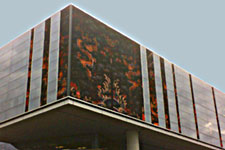
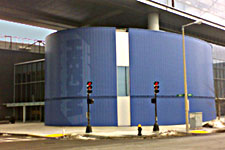
Photographs of WGBH, © 2008 P.J. Gardner. All rights reserved.
On February 6, 2008, Larry Goldberg, Director of the Media Access Group at WGBH, spoke to Boston-IA about WGBH's ground-breaking work in making multimedia accessible for the widest possible audiences. Larry's talk was entitled, "Beyond the Box: Media Access Anywhere and Everywhere".
The Media Access Group at WGBH is responsible for the National Center for Accessible Media (NCAM) and the captioning and video descriptions of WGBH programming. The meeting included a chance to experience the new state-of-the-art WGBH facilities in Brighton, Massachusetts.
Larry Goldberg demonstrated and discussed the promise and problems of captioning and description on PDAs, cell phones, digital TV, digital cinema, DVDs, in-flight systems, and Internet-based educational and entertainment services.
- Visit the Media Access Group at WGBH.
- Visit the WGBH page on Services for People with Disabilities.
- Learn more about the National Center for Accessible Media (NCAM).
- Read an article about a previous talk Larry Goldberg gave to Boston-IA.
First Annual Boston Usability Groups Networking Party (January 8, 2008)
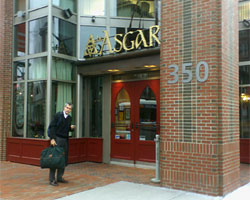
Boston-IA always welcomes the chance to collaborate with other Boston-area organizations concerned about the user experience.
On Tuesday, January 8, 2008, Boston-IA joined members of Boston's usability organizations for a fun-filled networking party to kick off the new year. The party was held at The Asgard Irish Pub & Restaurant, located between Central Square and the Massachusetts Institute of Technology, in Cambridge, Massachusetts.
The party was a great success. It was attended by over 135 people concerned about usability and human-computer interaction.
At the party, Boston-IA members had a chance to mingle with user experience professionals from the following premier Boston-area organizations:
- Boston CHI (Boston Chapter of ACM SIGCHI)
- NEC HFES (New England Chapter of the Human Factors and Ergonomics Society)
- IxDA Boston (Local Face-to-Face Group of the Interaction Design Association)
- UPA Boston and UPA NH (Boston and New Hampshire Chapters of the Usability Professionals Association)
- UX Boston (Boston Locale of the User Experience Network)
In order to coordinate events likely to be of interest to all our members, the consortium of Boston area user experience groups has established a new combined Google calendar:
- Boston Interactions Events Calendar (new window, limited accessibility).
Boston-IA is very pleased to be able to interact with other Boston-area organizations concerned about the user experience. We hope this party will be the first of many interactions for the Boston area user experience groups.
Photograph of The Asgard, © 2007 P.J. Gardner. All rights reserved.


